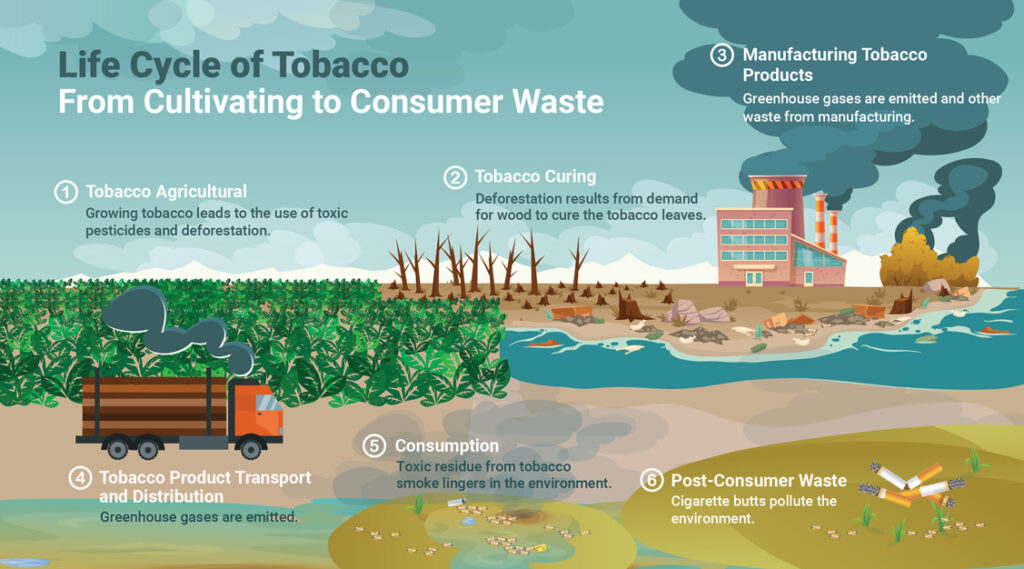
Tobacco Harm
Tobacco leads to millions of avoidable illnesses and kills more than 8 million people each year worldwide (WHO, 2021).
7 million of the deaths are a result of direct tobacco use while 1.2 million are a result of secondhand smoke (SHS) (i.e., involuntary environmental exposure to tobacco smoke).
This page discusses the negative health and environmental impacts of tobacco use and tobacco production in Nigeria.
The leading causes of death globally were cardiovascular diseases (17.9 million deaths in 2019)
, Chronic Obstructive Pulmonary Disease (COPD) (3.23 million deaths in 2019), and lung cancer (1.80 million deaths in 2020). The burden of tobacco use is high in developing countries, and it is estimated that, by the year 2030, 4 out of every 5 tobacco-attributed deaths will occur in developing countries. Nigeria is the most populated country in Africa and also one of the leading tobacco markets on the continent, with more than 18 billion cigarettes sold annually. The Global Adult Tobacco Survey (GATS, 2012) indicates that 6.5 million (5.6%) of adults in Nigeria use tobacco, with a higher prevalence among males (10%) than females (1.1%).The Global Youth Tobacco Survey (GYTS) reports that 15.4% of youth in Nigeria aged 13-15 use tobacco products in Nigeria.Tobacco is the only legal consumer product that kills up to half of its users when used exactly as intended by the manufacturer.
Pan American Health Organisation
Smoking causes more deaths than tuberculosis (TB), HIV/AIDS and malaria each year, costing $1.4 trillion worldwide in healthcare expenditure and lost productivity from illness and premature death (WHO, 2017).
Research indicates that approximately 128,000 smoking attributable disease events in Nigeria are attributed to tobacco use and 29,472 deaths were caused by tobacco smoking in Nigeria in 2017.
Ailments Caused by Smoking Cigarettes
The figure below describes the effects of smoking in the human body.
Infographic Source: US Department of Health and Human Services. (2014)
The graph below presents Tobacco Attributable Diseases in Nigeria, in 2019.
Tobacco Attributable Diseases
Data source: CSEA and IECS “Health and Economic Costs of Tobacco Smoking in Nigeria”
Tobacco and other diseases
Tobacco use is a major risk factor for premature death from lung cancer, chronic obstructive pulmonary disease, dementia, sudden infant death syndrome (SIDS), menstruation and menopause, birth defects, vision loss, gastrointestinal diseases, skin damage, weak bones and cardiovascular disease.
The WHO estimates that 20% of TB incidences are attributable to tobacco use. Evidence shows that reducing tobacco use improves TB outcomes.
A projected mathematical model predicted that a total of 113 million tuberculosis cases and 88 million deaths from tuberculosis globally would be attributable to smoking between 2010 and 2050. In Nigeria, a study using 2012 GATS data found that the proportion of TB deaths attributed to smoking hovers around 3.8%.Secondhand smoke
The World Health Organization (WHO) defines secondhand smoke (SHS) as the involuntary exposure to tobacco smoke. SHS is responsible for 1.2 million deaths per year globally.
13.3 million adults are exposed to SHS in public areas in Nigeria (6.4 million in restaurants, 3.6 million in government buildings, 1.2 million in healthcare facilities and 2.1 million in public transportation). A community-based study done in Nigeria showed that daily smoking within the household increased the likelihood of otitis media by up to five times among children under the age of five.
According to the WHO, maternal cigarette smoking is associated with increased risks of ectopic pregnancy, premature rupture of membranes, miscarriage, stillbirth, preterm labour, preterm birth, and congenital anomalies such as cleft lip. The WHO further asserts that after birth, the risk of sudden infant death syndrome (SIDS) is higher among the offspring of women who smoked during or after pregnancy. Exposure to second-hand smoke (SHS) during pregnancy increases the risk of low birth weight ( < 2500 g) by 22%. There is also strong evidence linking parental smoking to respiratory infections in children, such as wheezing, asthma, bronchitis and nocturnal cough.
GATS (2012) estimates that, in Nigeria, 17.3% of non-smokers (2.7 million) who worked in an enclosed office were exposed to tobacco smoke at their offices, while 23.9% of adults (6.4 million) were exposed to SHS in public places such as restaurants and hotels. More recent data from an eastern state in Nigeria puts the rate of exposure of SHS at home and public places at 7.7% and 16.4%, respectively.
Economic costs of tobacco
Tobacco imposes direct and indirect costs on the economy. In 2015, the estimated accumulated loss to tobacco in Nigeria was put at ₦1.5 trillion (Adebowale, 2018).
Treating diseases caused by tobacco is expensive and is estimated to have cost ₦526.4 billion in 2019 (USD 1.71 billion), which is nearly one tenth of all healthcare costs in Nigeria.
Taxes raised from tobacco products amounted to N58 per pack in 2019,
which means that 93% of smoking-related healthcare costs are not recouped through taxes. By 2020, the Nigerian government would have accrued ₦37.3 billion from cigarette production in excise tax revenue. It is evident that the healthcare costs associated with tobacco related illnesses are far larger than the tax raised on tobacco products.Indirect costs are difficult to measure and can be expensive. These include employee absenteeism and reduced or lost productivity due to tobacco-related illness and disability, and premature death. Other indirect costs include fire damage and widespread environmental harm from large-scale deforestation, pesticide and fertilizer contamination from tobacco farming, and discarded litter. For Nigeria, the estimated indirect costs amounted to USD107.6 million in 2019.
There are inadequate early detection programs and many people do not have access to hospitals and care facilities that treat conditions such as cancer.
The direct and indirect costs for this part of the population are particularly high. The economic costs of tobacco-related diseases in three hospitals in Ibadan, Nigeria indicate that the economic burden of tobacco-related diseases was higher among the poor and among males. The treatment costs for most tobacco-attributable diseases represent a catastrophic health expenditure ranging between 10% and 565% of the Nigerian per capita income.The graph presents the annual direct costs of tobacco attributable diseases in Nigeria in 2019.
Direct Costs of Tobacco Attributable Diseases in 2019
Data source: CSEA and IECS “Health and Economic Costs of Tobacco Smoking in Nigeria”
Smoking Cessation and Health Benefits
Over time, people who quit smoking see many benefits to their health. After a person smokes their last cigarette, their body begins a series of positive changes that continue for years.
Life Cycle of Recovery
How Quickly Your Health Improves after Quitting Smoking
Tobacco products harm the environment at every stage of their production and consumption, from farming to disposal of the final product. Globally, the tobacco industry is responsible for 84 million tonnes of greenhouse gas emissions into the atmosphere (Tibi, 2018).

Source: Bialous et al., (2017). Tobacco and its environmental impact: An overview.
90% of tobacco production happens in developing countries. Therefore, the environmental costs of tobacco production are mostly borne by poorer countries, whereas the majority of the profits from tobacco production are made by rich countries.
Globally, in 2018, tobacco production was 6.3 million tonnes, 722,187 tonnes of this in Africa, which is equivalent to 11.4% of global production. In Nigeria, tobacco is mostly cultivated in the following states; Osun, Oyo, Kwara and Sokoto. In 2015, 12.2 billion cigarette sticks were produced in the country.Consumption and disposal
Smoking and cigarette disposal are also significant contributors to environmental damage.
Smoke from cigarettes and other smoked tobacco products releases toxic chemicals into the air. Greenhouse gases such as carbon dioxide, methane, formaldehyde, and nitrous oxides are also found in tobacco smoke; these chemicals have been found on surfaces months after smoking has ended.
Up to two-thirds of cigarettes are disposed of on the ground, and often end up in water systems. Not only are these polluting the environment with plastic, but cigarette filters contain cancer-causing chemicals and other dangerous toxins. The long-term effects of this are still unknown.


